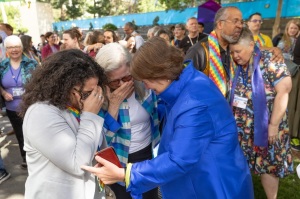The Case of the Pro-Life Movement: On Demography and Marriage
Many experts are genuinely puzzled as to what is driving the recent—dramatic—decline in the teen pregnancy rate, for it doesn't correlate with increased use of contraceptives. Interestingly, there is some research that has even shown that teen pregnancy declines are the greatest in areas where the viewership for 16 and Pregnant and Teen Mom is the highest, so one wonders whether such shows are shaping the attitudes and the behavior of young people. Overall, the abortion rate has been falling for all demographic groups, but the declines have been the greatest among teenagers and minors. This bodes well for the future of the pro-life movement.
Now I certainly cannot promise that attitudes toward same-sex marriage will change in the same way that attitudes toward abortion have changed. Obviously, the parallel between abortion and same-sex marriage is not a perfect one. Unlike same-sex marriage, there is a clear victim in an abortion. The US Supreme Court intervened much earlier during the abortion debate than it did during the same-sex marriage debate. Still future developments might shape and influence opinions toward traditional marriage in some unexpected ways. Here are a couple examples.
Religious Liberty
The media has already reported on numerous stories of bakers, florists, and caterers who have faced harassment, fines, and even the loss of their businesses for their refusal to participate in same-sex marriage ceremonies.
These sorts of stories will become more common now that same-sex marriage has become the law of the land. Licensing boards for various public health and counseling professions may withhold accreditation or licensing for individuals and companies that refuse to publicly support same-sex marriage. Religious universities that do not offer spousal benefits to same-sex couples may lose accreditation or eligibility for government grants, and students attending these schools may be unable to receive federal financial aid. Many Christian schools may have to make painful choices between upholding their religious beliefs and staying afloat financially.
Many American supporters of same-sex marriage either are members of organized religions or respect organized religion. Some of them want to see religious institutions treated fairly and, during the fight for same-sex marriage, perhaps were accustomed to insisting that religious institutions would be treated fairly. The tension between same-sex marriage and religious liberty will only become more evident over time. The reality of institutionalized same-sex marriage, it seems, will turn out to have consequences that some of its proponents insisted it would not. This may well give some supporters of same-sex marriage pause.
Same-Sex Parenting
The problem with studies about same-sex parenting is that there currently are not a lot of good data. But if same-sex marriage becomes the law of the land, then there will be more same-sex parents. Researchers will be better able to assess the question of how well children fare when they are raised in same-sex households.
Although it will take some time for good datasets to emerge, one should not underestimate the possibility of scholarly consensus in the long run. Social science tends to police itself fairly well; data, for instance, have to be made public whenever a paper is accepted at a peer-reviewed journal. On some controversial issues, there is more scholarly consensus than most realize. For instance, good social scientists from a range of ideological perspectives largely agree that children fare better in two-parent households than in single-parent households. All in all, the side that is backed up by the best data may win—even if winning may take a very long time
While academic studies may shape opinions, personal anecdotes can be even more compelling. Public Discourse has published poignant essays by Robert Oscar Lopez and Katy Faust, who discuss their experience being raised by same-sex parents. Both authors love and respect those who raised them. Faust even supported same-sex marriage at one point. However, both authors came to oppose same-sex marriage publicly, arguing that they would have fared better if they had been raised by a father and a mother—that they have missed out on something essential. Stories like this will probably become more common if same-sex marriage in enshrined in law; recall that, forty years ago, no one thought that post-abortive women would become some of the most effective spokespeople for the pro-life movement.
When Roe v. Wade was decided in 1973, no one could have predicted the developments that shifted public opinion in a more pro-life direction. Abortion opinion trends during the past forty years should offer some reassurance to supporters of traditional marriage. It's hard to anticipate how reality will turn around and confront public opinion, but the truth often has a way of revealing itself. Demography today is not necessarily destiny tomorrow.
This column was originally published in Public Discourse.




























